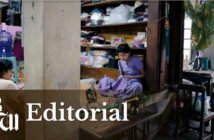Do the actions of one reflect on a group?
When traveling to Paris and struggling on how to ask for a glass of water, do you represent all ignorant Americans?
When you are a Muslim woman living in a post 9/11 world, does that allow others to judge you as a terrorist?
When you are a member of a fraternity and vandalize the multicultural house, should your entire chapter have consequences?
The Lehigh Code of Conduct, the administrators and many students say so.
The vandalism and hate crime that occurred at UMOJA in November deserve to be punished. However, the alleged code of conduct violations against Sigma Chi open another issue: Should the whole chapter be punished? Did Sigma Chi create a climate where these sort of actions were thought to be OK — or was the perpetuator even encouraged by his brothers?
It is human nature to generalize about a group of people, especially one that we are unfamiliar with. This does not make it right, but it does happen. This is what stereotypes stem off of — and when this generalizing becomes a problem.
We are taught from an early age that our actions have bigger consequences than just individual ones. This is heightened when we come to college. Many scholarships and financial aid depend on good conduct and grades. Losing financial aid or being suspended from Lehigh is not only a letdown to ourselves, but often also a letdown to our families, who worked to help us attend Lehigh.
Organizations we join also enforce this mentality. In the digital age, a misstep or inappropriate act can quickly bring national attention to a negative event.
Greek chapters repeatedly tell their members that they are “always wearing their letters.” This team-oriented mentality is often instilled during new member education. One serious incident, or many small offenses, can mean the end of a chapter’s existence, and many affiliated students try to heed that lesson.
If we try to reinforce that mentality to enact positive behavior, it would be hypocritical to point fingers and isolate individuals when things go wrong.
Succeed as an organization, fail as an organization.
Many have argued that Greek chapters are under more scrutiny than other organizations on campus. What if the perpetrators were not Greek students but were both members of an academic club? Should the club be disbanded because their actions reflect on the club?
What if they were members of a sports team? Should the whole team be suspended and not allowed to participate in Patriot League or NCAA play?
There are too many external factors — the other teams the suspended team would be playing against, loss of revenue from ticket sales, etc. — that keep sports teams from being punished in the ways of suspension as a group. This is not to say that they are not held accountable for their actions, but there are different repercussions because at the core, they are different in nature and intent than Greek organizations.
Sports teams exist to foster athleticism and constructive competition. Academic clubs exist to serve as an extension of classroom learning. Service clubs exist to better the surrounding and greater community. Greek organizations exist are based on intangible values that were set in place: service, loyalty, fraternal bonds, justice, love, leadership and scholarship. These are the values that some of the Greek organizations on our campus stand for.
Organizations with high expectations of their members are subject to higher scrutiny. If they do not stand for their values, they are nothing more than social clubs that drink a lot.
This is not the first time a Greek organization is held accountable for the actions of a few, nor will it be the last. Even within the last few years, chapters like Phi Gamma Delta and Delta Gamma were removed from campus. There were people in both chapters trying for positive improvement and change, but the actions and choices of the less constructive members caused their removal.
We must hold our peers accountable for their actions, as they reflect on ours too, and the image of Lehigh or our respective organizations as a whole.
There may have only been one or two perpetrators in the UMOJA incident, but their actions reflect on their chapter, and on Lehigh as a whole.
Greek chapters were established to build better people. They claim to be values-based organizations, and thus bring upon the responsibility of living by those values and burden of being held to a high standard.
– The Brown and White Editors





Comment policy
Comments posted to The Brown and White website are reviewed by a moderator before being approved. Incendiary speech or harassing language, including comments targeted at individuals, may be deemed unacceptable and not published. Spam and other soliciting will also be declined.
The Brown and White also reserves the right to not publish entirely anonymous comments.